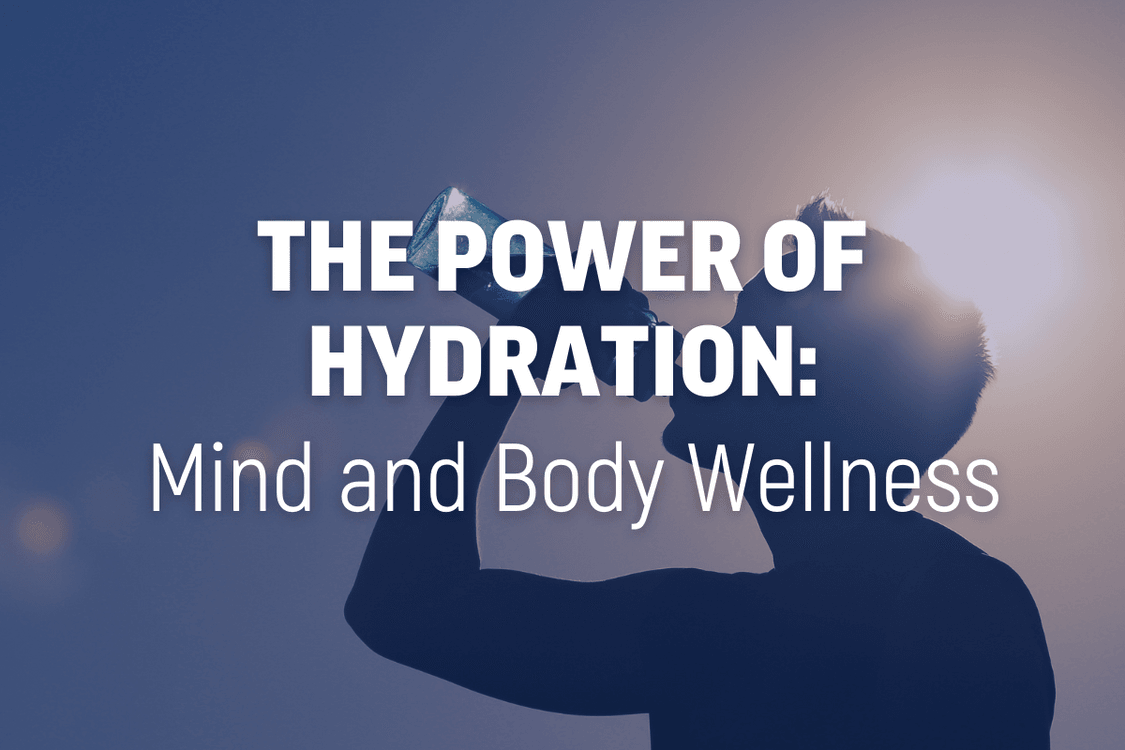
The Power of Hydration: Mind and Body Wellness

Let's talk about the superhero of wellness: hydration! Water is like the magical potion that plays a starring role in everything your body does. Since our bodies are made up of 60% water [1] it makes sense that it needs water to keep our bodies running smoothly.
Think of water as the VIP guest at the body's party—essential for cells, digestion, staying cool, and even helping your brain do its thing. Without enough water, you might feel like your body's engine is sputtering! [2]

Understanding Hydration Needs
Your daily water intake isn't one-size-fits-all [3] You know that whole "eight glasses of water a day" thing? It's been around for ages, but it's more like a rough guideline than a precise formula. Our bodies are diverse, and how much water we need can vary a lot from person to person.
For grown-ups, aiming for 8-12 cups (around 2-3 liters) of fluids daily usually does the trick. But here's the catch: if you carry a bit more weight [4] , your body might need a tad extra to stay nicely hydrated. Plus, when it's hot outside or you're really sweating it out during workouts, you might need more water to stay balanced [5] .
Your daily routine also matters! If you're constantly on the go—whether it's running, hitting the gym, or doing physically demanding work—your body might shout out for more water to keep up with your hustle.

The trick? Listen to what your body tells you. Pay attention to thirst cues and adjust your water intake based on how you feel. Understanding these factors helps you tailor your hydration game to fit your body's unique needs, keeping you feeling top-notch!
Hydration's Effect on Brain Health and Function

Several studies [6] explored the impact of not drinking enough water on how we think and feel. When people were dehydrated, like not having enough water for 36 hours, they felt less energetic and had a lower mood.
They also struggled with things like remembering stuff and paying attention. Some research even found that after just 24 hours without water, people felt more tired, less alert, and reacted slower. What causes these effects?
Water is super important for our brains to work well. See, our brain cells talk to each other using signals like electric pulses and chemicals called neurotransmitters. [7] These signals are crucial for thinking, doing stuff, and overall brain smarts. Water steps in here by keeping the fluids around these cells balanced just right. This balance helps these signals travel smoothly, making it easier for brain cells to chat, which helps with thinking, learning, and remembering stuff.
Also, water's like a delivery service for our brains. It carries important stuff like vitamins, minerals, and oxygen through our blood, which is mostly made of water. These goodies are essential for our brains to stay healthy and work right. Making sure we drink enough water helps these good things reach our brains, keeping them in top shape.
In simple terms, water does a lot for our brains! It helps brain cells talk to each other, cleans out the bad stuff, and brings in the good stuff our brains need. So, making sure we stay hydrated is super important for keeping our brains sharp and healthy.
Effective Ways to Maintain Hydration:

-
Sip Water Regularly. Make it a habit to drink water throughout the day. Keep a trusty water bottle by your side to remind you to take sips often, ensuring you meet your body's water need.
- Check Your Urine. Keep an eye on the color of your pee; if it's light yellow, you're doing great! Darker pee might mean you need more water, so use this clue to adjust how much you're drinking. [8]
- Go for Hydrating Foods. Toss some water-rich fruits and veggies into your meals, like watermelon, cucumbers, oranges, or lettuce. They're not just tasty but also help keep you hydrated. [9]
- Set Personal Hydration Goals. Figure out how much water your body needs based on what you're up to and where you are. Hot weather or lots of moving around might mean you need extra hydration.
- Balance Electrolytes.[10] If you're sweating a lot, especially during workouts, grab foods or drinks with electrolytes to keep that balance in check. It's crucial for when you're working up a sweat.
- Drink Before Meals. Gulp water before digging into your meals. It's good for hydration and might even help you not overeat.
- Hydrate During Workouts. Keep hydrated before, during, and after exercising to make up for the fluids lost while sweating it out. Sometimes, sports drinks with electrolytes can be handy for longer workouts.
- Mind Your Drinks. Watch out for how much caffeine or alcohol you're having, as they can make you lose more fluids. If you enjoy these drinks, just make sure to balance them with some extra water.
- Use Reminders. Set up reminders on your phone or use apps to nudge you into drinking water regularly, especially if you tend to forget.
- Factor in the Environment. Be extra careful about hydration when it's super hot, you're in high places, or it's dry outside. These situations can make you lose more fluids, so keep that water handy!
In addition, it's crucial to explore avenues that not only replenish our body's fluids but also enhance our cognitive abilities. That’s why we formulated a unique blend of hydration and brain-boosting ingredients. Savvy Beverages are specialized beverages that not only quench your thirst but also contain powerful natural compounds scientifically shown to enhance cognitive performance. By incorporating brain-supportive elements like ginseng, green tea extract, and adaptogens such as Rhodiola Rosea, nootropic drinks offer an exciting avenue for boosting mental clarity and focus.

Closing Thoughts
In essence, understanding the significance of hydration, both for overall bodily function and specifically for brain health, empowers us to make informed choices and adopt habits that support our well-being. By respecting our body's hydration needs and implementing practical hydration strategies, we can unlock the potential for a healthier, sharper, and more energetic life. Cheers to staying hydrated and thriving!
References:
[1] What is the average percentage of water in the human body?
[2] Acute and chronic effects of hydration status on health
[3] Water Intake, Water Balance, and the Elusive Daily Water Requirement
[4] Association between water consumption and body weight outcomes
[5] Hydration Status: Influence of Exercise and Diet Quality
[7] Physiology, Neurotransmitters
[9] 15 foods that help you stay hydrated
[10] Electrolytes







